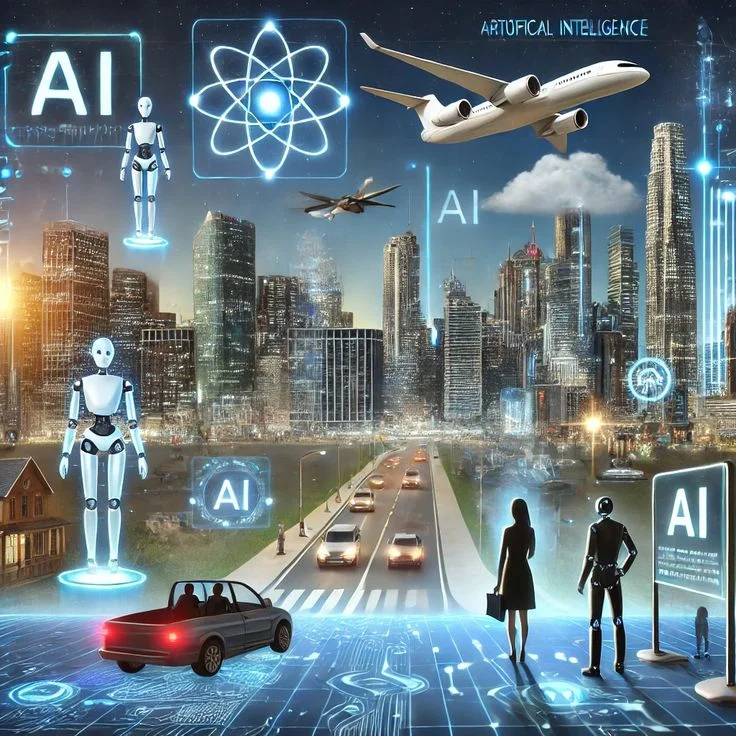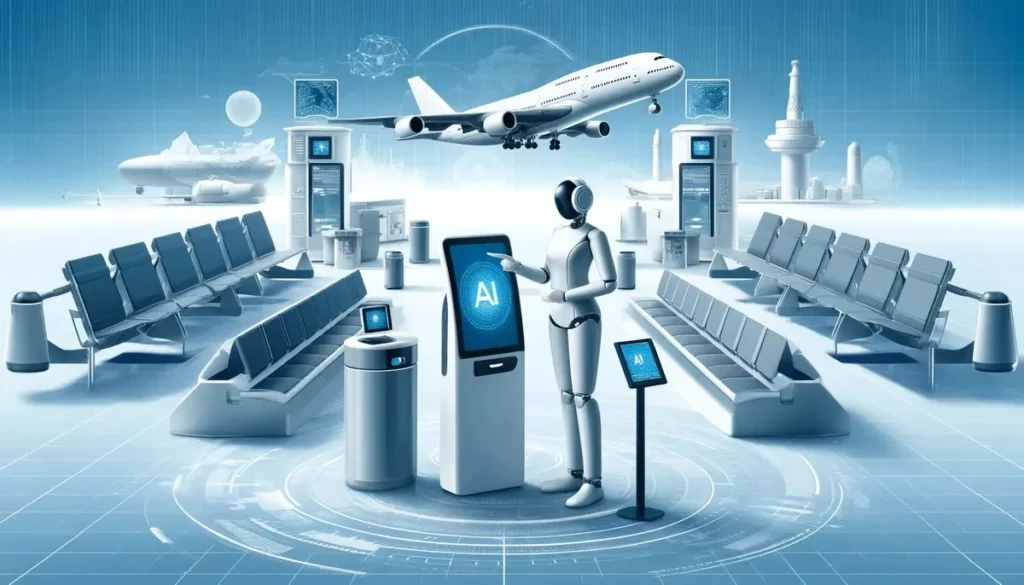In 2025, AI in travel isn’t just a trend—it’s becoming the backbone of travel technology. Once a novelty, travel automation now touches every step of the journey, from planning to post-trip follow-up. AI is very important for all of us to classified our journey. The global AI in tourism market, valued at around $2.95 billion in 2024, is expected to grow more than fourfold by 2030—reaching $13.4 billion. This surge is fuelled by rising demand for personalized recommendations, smart booking systems, and AI-powered chatbots that streamline bookings and provide 24/7 support.
Travelers increasingly expect tailored itineraries, real-time updates, seamless experiences—and even AI-powered sustainability initiatives that help reduce carbon footprints. As AI travel tools like generative agents and predictive analytics become mainstream, the frontier shifts from novelty to necessity. In this guide, we’ll explore how modern AI travel solutions—from immersive AR previews to carbon-monitoring algorithms—are transforming trips to be faster, smarter, more personal, and kinder to the planet.

Understanding AI & Automation in Travel:
AI stack, intelligent automation, and travel automation. The AI stack comprises layered components—from data collection to model deployment and intelligent agents—that power today’s tools like AI-powered chatbots, predictive pricing, and dynamic booking systems. This intelligent automation (IA) marries AI with robotic process automation (RPA), eliminating repetitive tasks like confirmation emails or price checks. As a result, smart booking systems can swiftly analyse traveller preferences, provide personalized recommendations, and adjust prices in real-time, enhancing both operational efficiency and customer delight.
This automation extends further: micro services architecture now supports AI-driven itinerary planning and predictive maintenance—modular SOA-based systems that scale with demand. When combined with predictive analytics, travel platforms can forecast booking trends, allocate flights, hotels, and even staff more effectively. What once required complex manual coordination is now handled automatically, so travellers experience smoother, more intuitive journeys. Yet, this doesn’t diminish human hospitality—it complements it. As leaders at Cannes noted, AI-powered virtual assistants and personalized tools serve as the invisible backbone behind seamless experiences, letting genuine hospitality shine through.

Personalized Travel Planning:
Today’s AI in travel shines brightest in crafting tailor-made adventures. Tools like Guide Geek, an AI-powered travel assistant, generate custom itineraries in seconds via WhatsApp or Instagram. Travelers can ask for a “family week in Bali” or “wheelchair‑friendly Zurich day,” and receive Plans with restaurants, accommodations, hidden gems—complete with personalized recommendations and real-time support. These are not generic suggestions, but responsive systems combining predictive analytics, traveller preferences, and live updates to form rich, mobile-friendly guides.
Meanwhile, the INDIANA platform showcases how wearables + AI improve convenience and well-being. By tapping wearable sensors and tracking location, weather, and activity history, the system serves context‑aware suggestions—like suggesting a shaded walking route on a hot day or a wellness break when your step count drops. This fine-grained, context‑aware travel planning elevates the experience beyond scheduling. It combines AI travel insights, IoT in tourism, and travel data analytics—creating experiences that feel intuitive, seamless, and deeply personal. Whether through generative itinerary bots or health‑driven planning, AI-powered personalized travel planning is redefining how journeys are designed, making every trip smarter and more aligned with individual needs.
Smart Booking & Dynamic Pricing:
Modern travel technology is powered by smart booking systems that use AI in travel to drive travel automation and operational efficiency. These platforms harness dynamic pricing—a method where fares and rates adjust in real-time based on predictive analytics, demand, competitor pricing, and seasonality. Airlines like Delta and Lufthansa update seat prices every few minutes, maximizing revenue and responding to shifting travel patterns. Similarly, AI-powered dynamic pricing is revolutionizing how tour operators and hotels optimize offers, using ML to track booking trends and micro-segmentation for personalized deals.
At the core of this innovation are AI-driven predictive analytics models. These engines analyse millions of data points—historical bookings, weather, local events—to forecast demand and make informed pricing decisions. For example, tools like Hopper and Google Flights alert traveller’s when booking costs are expected to drop, while smart booking systems adjust offers or apply discounts dynamically through dynamic packaging. Behind the scenes, micro services architecture enables rapid data processing and real-time rate updates, ensuring consistent user experience even during peak periods.
All of this is anchored by yield management strategies borrowed from airline revenue teams, where AI sets the optimal price for every seat or room. As a result, travellers enjoy smarter deals—while businesses maximize revenue, improve occupancy, and enhance satisfaction. AI-powered personalized travel planning, combined with dynamic pricing and AI travel insights, ensures each booking is not only efficient but also tailored to individual preferences.
Chatbots & Virtual Assistants:
Today’s smart travel uses AI-powered chatbots and virtual assistants to deliver real-time support and personalized recommendations around the clock. Travelers can chat as they would with a friend—asking, “Find me a flight to Paris under $800,” and instantly getting tailored options via conversational interfaces. Brands like Expedia, Hilton, KLM, and Emirates now deploy chatbots that handle bookings, flight updates, baggage tracking, and even multilingual translation.
These AI travel assistants don’t just answer FAQs; they actively manage trip logistics—rebooking disrupted flights, notifying users of delays, and adjusting itineraries on the fly. Some solutions even use emotion-sensitive AI, offering empathetic, human-like responses. As AI travel tools, chatbots enhance operational efficiency by taking routine tasks off human agents, freeing them to focus on complex needs. With AI-powered chatbots for travel now handling 80% of customer interactions in top-tier travel companies, these virtual helpers are quietly reshaping traveller expectations—making trips smoother, more personal, and responsive.
Airport & Hotel Automation:
AI is transforming travel with facial recognition for airport check-ins, making journeys more seamless and efficient. Airports like Singapore’s Changi and Korea’s KAC use biometric screening (face or palm-vein scans) to speed up entry and boarding, reducing wait times significantly—with automated scanners and 3D CT baggage systems enhancing both security and convenience. These AI-powered screening systems not only streamline operations but also improve operational efficiency, all without compromising safety.
Inside hotels, AI in travel extends beyond guest-facing tools to behind-the-scenes hotel automation. Smart room systems adjust lighting, climate, and housekeeping based on occupancy, cutting energy costs by up to 20–30% and enhancing guest comfort. Predictive maintenance alerts staff before equipment fails, avoiding downtime and disruption. Meanwhile, robotic housekeepers and concierge bots free staff to focus on hospitality. AI-powered chatbots like Hilton’s “Connie” and automated kiosks handle check-ins and service requests instantly, enabling hotels to offer personalized recommendations and real-time support around the clock.
Together, these smart destination systems—from airports to hotels—bring traveller convenience and travel automation full circle, making each trip feel both more personal and highly efficient.
Immersive AR/VR Experiences:
Stepping beyond typical travel, AR travel experiences and VR destination previews are reshaping how we explore the world. Imagine pointing your phone at the Sheikh Zayed Grand Mosque and instantly seeing historical facts and architectural details overlaid—thanks to augmented reality, this enriches sightseeing with real-time insights and interactive engagement. In the comfort of home, virtual reality tours offer a full journey preview—walk the cobbled streets of Prague or experience a sunset at Machu Picchu before booking, all powered by immersive travel technology.
Innovations like Niantic’s VPS-powered AR tour guide (used via Snap Spectacles) deliver geo-precise, context-aware suggestions—you tap a landmark and learn its story, historical context, or even local dining tips. And with devices like Google’s Android XR glasses—featuring Gemini voice assistant and AI micro services reservation systems in headset form—travel previews become conversational and seamless. These AI travel tools bring a new level of personalization: walk through your future vacation virtually, explore lodging layouts, check accessibility features, or test out wellness-friendly routes. The result? A pre-trip experience that’s intuitive, immersive, and tailored—setting a higher bar for future travel and blending AI-powered personalized travel planning with engaging, interactive previews.
Smart Destinations & Infrastructure:
Travel today means more than personal convenience—it’s about smart destinations built on AI, IoT, and data-driven systems. Smart cities like Singapore’s Marina Bay use smart tourism infrastructure, with sensors that monitor crowd density, intelligent waste bins, and real-time lighting control to improve flow and cut energy use.
Thinks & Labellum’s solution even recommends less crowded attractions and eco-friendly travel routes via mobile apps, offering context-aware suggestions and enhancing sustainability. These AI-powered travel tools help destinations manage visitor volumes, reduce overcrowding, and optimize services—making travel more personalized, efficient, and sustainable. Smart infrastructure ensures every trip feels thoughtfully crafted, blending convenience with smart urban planning.
Sustainability & Eco‑AI:
Artificial intelligence is becoming a powerful tool for building greener, more sustainable travel. Airlines now use AI-optimized flight paths to reduce fuel burn and emissions. For example, Alaska Airlines Leverages Flyways AI to optimize routes on over half its flights, saving 1.2 million gallons of fuel and reducing 11,958 metric tons of CO₂ annually—cutting emissions by ~3–5% per flight over four hours. Similarly, projects like Google and American Airlines’ Project Contrails use predictive algorithms to avoid high-humidity airspace, slashing contrail-related warming by more than 50%, with only a minimal 2% fuel impact.
On the ground, hotels embrace AI-powered sustainability initiatives to reduce energy, water, and waste. Smart HVAC systems and sensor-enabled lighting cut energy use by up to 30 %. Systems like Winnow help hotel kitchens track food waste—e.g., Aerostar saved 1,100+ tonnes of food in 2023—while smart water systems detect leaks and optimize usage. These AI travel insights not only lower carbon footprints but also improve bottom lines and guest satisfaction.
Eco-travel platforms now integrate carbon tracking tools—from Atmospheric calculators to block chain-enabled offsetting to transparency-focused apps—empowering travellers to measure and reduce environmental impact. Combined with smart route planning and sustainable accommodations, AI-powered carbon reporting in tourism is emerging as a key differentiator in green travel. By weaving travel data analytics, predictive maintenance, and context-aware suggestions into real-world use, Eco‑AI ensures trips are increasingly efficient, personalized, and planet-conscious. The result? Travel that’s smarter not just for us—but for our world.
Privacy, Ethics & Security:
As AI in travel gathers more data, traveller data privacy and AI ethics become paramount. Laws like GDPR and the EU AI Act require transparent data collection, informed consent, and robust safeguards like encryption, multi-factor authentication, and regular security audits to protect sensitive identification and itinerary data. Airlines and hotels must also prevent algorithmic bias—ensuring fair treatment across demographics—by auditing models, diversifying datasets, and providing clear explanations when personalization detects sensitive traits.
Travelers deserve control over their information. Airlines should allow opting out, data review, and deletion—promoting digital self-determination. With AI governance frameworks in place, the travel industry can balance innovation with trust—making smart, AI-powered travel tools feel both safe and ethical.
AI for SMEs & Niche Operators:
Small and niche travel agencies are finding that AI-powered travel tools are no longer out of reach—they offer AI in travel solutions that are affordable and practical. AI automates routine tasks like bookings, itinerary creation, and data analysis, freeing up time for staff to focus on personalized service and local expertise. Independent agents, like Cruise Planners’ Jennifer Hardy, use generative AI for marketing and client communication, cutting admin time while maintaining quality engagement.
Sentiment‑analysis tools help SMEs track guest feedback on social media and adjust services based on insights—boosting satisfaction and reputation. AI travel planners also offer efficiency gains, curating options in line with small agency workflows and corporate policies. Meanwhile, intelligent marketing platforms like Market Muse or Deeply Write help SMEs create optimized content without hiring specialists.
By embracing smart booking systems, predictive analytics, and AI travel insights, niche operators can offer personalized recommendations, seamless experience, and improve operational efficiency—on par with larger players, but with unique local charm.
Traveller Well‑Being & Inclusivity:
AI is reshaping travel into a more inclusive and supportive experience. Tools like Navigate, a real-time AI navigation aid for people with visual impairments, combine LiDAR, vibration feedback, and LLM-powered guidance—letting traveller’s move confidently without toggling apps. Studies show that AI-powered assistive technologies reduce stress, boost autonomy, and strengthen social connections for travellers with disabilities—leading to happier, more satisfying journeys.
Beyond mobility, AI-powered well‑being analytics monitor factors like fatigue or stress, offering proactive suggestions—such as rest stops or wellness breaks. These context-aware travel planning features support emotional resilience throughout the journey. From accessible navigation to personalized AI travel insights, inclusive travel tech ensures every journey is not only smarter but also kinder, more empowering, and deeply human.
Future Outlook & Trends:
The horizon of travel technology shines brighter thanks to agentic AI and generative AI travel tools. These can act autonomously—booking, rebooking, and planning with minimal prompts—a major leap from static chatbots. Booking Holdings, for instance, is embedding generative agents across flights, hotels, and activities to create fully integrated connected trips. At events like Cannes Lions, leaders stressed that despite digital advances, the human touch in hospitality remains essential.
Looking ahead, we expect AI-enhanced autonomous travel solutions—think self-driving car transfers, drone deliveries, and pilotless short-haul flights (eVTOLs)—to take flight in the 2030s. Meanwhile, subscription-based travel models and leisure-focused personalization will gain momentum: traveller’s want flexibility, sustainability, and expertly curated experiences. As AI travel insights mature, expect more proactive, predictive, and immersive journeys—think voice‑activated planning, wellness suggestions, and pre-trip VR previews—ushering in a smarter, more human-cantered era of travel.
Conclusion & Take Action:
AI in travel is no longer futuristic—it’s reshaping travel technology, enabling travel automation, personalized recommendations, and AI travel insights across every touchpoint. From AR previews and smart booking systems to sustainability tools and inclusive assistance, the benefits are clear: smoother, smarter, and more meaningful trips for everyone.
Ready to embrace this new era? Discover how AI-powered personalized travel planning can work for you—try a chatbot demo, explore a smart booking platform, or pilot a small eco‑AI initiative. Don’t just read about the future—experience it.
Want to dive deeper? Download our free guide to AI in travel—packed with case studies, tool comparisons, and a five-step implementation roadmap. Or book a free consultation to explore how these AI-powered travel tools can elevate your journeys and operations today.


